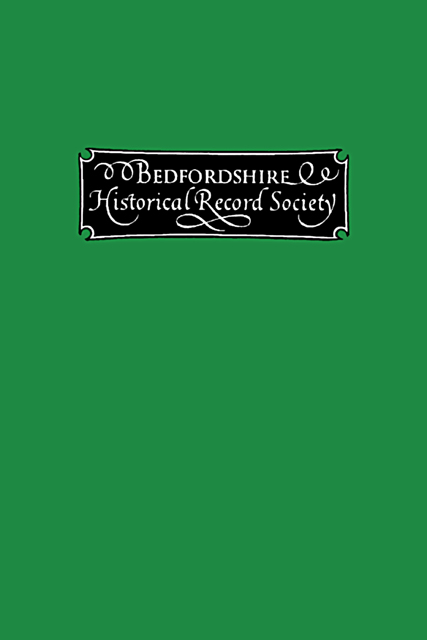Book contents
- Frontmatter
- Contents of Volume II
- Rules for Transcription
- Corrections and Additions to Volume i
- Frontispiece : Seal of Hugh de Beauchamp to face In Memoriam C. G. C
- The Bedfordshire Wills and Administrations proved at Lambeth Palace and in the Archdeaconry of Huntingdon
- The Beauchamps, Barons of Eaton
- Ancient Bedfordshire Deeds, No. I
- Records of Northill College, No. II.
- Bedfordshire Charters in the Missenden Cartulary
- The Browne Family of Arlesey
- Markets and Fairs of Luton
- The Assessment of Knight Service in Bedfordshire, No. I
- Materies Genealogica, No. I
- An Early Bedfordshire Taxation
- A Commutation of Villan Service
- Records of Knight Service in Bedfordshire
- Notes and Replies: —Ravensden and Chainhalle: G. H. F.—Toddington Place Names, 1453 : F. A. P-T.— Luton Names in the xiith Century : G. FI. F.—Duties on Bricks : H. S. Holt
- Index
Markets and Fairs of Luton
Published online by Cambridge University Press: 14 July 2023
- Frontmatter
- Contents of Volume II
- Rules for Transcription
- Corrections and Additions to Volume i
- Frontispiece : Seal of Hugh de Beauchamp to face In Memoriam C. G. C
- The Bedfordshire Wills and Administrations proved at Lambeth Palace and in the Archdeaconry of Huntingdon
- The Beauchamps, Barons of Eaton
- Ancient Bedfordshire Deeds, No. I
- Records of Northill College, No. II.
- Bedfordshire Charters in the Missenden Cartulary
- The Browne Family of Arlesey
- Markets and Fairs of Luton
- The Assessment of Knight Service in Bedfordshire, No. I
- Materies Genealogica, No. I
- An Early Bedfordshire Taxation
- A Commutation of Villan Service
- Records of Knight Service in Bedfordshire
- Notes and Replies: —Ravensden and Chainhalle: G. H. F.—Toddington Place Names, 1453 : F. A. P-T.— Luton Names in the xiith Century : G. FI. F.—Duties on Bricks : H. S. Holt
- Index
Summary
The revenues derived from markets and fairs were originally considered to be a royal perquisite; hence every ancient market and fair in England is supposed to have derived its existence from a Charter or Grant from the Crown; if no such Charter could be found at a later date its grant might be presumed from long use. In the case of Luton we have an exception to the general rule because at the time when our oldest market and fair were established the manor formed part of the ancient demesne of the kings of England and the king had no need to make a grant to himself. The earliest record of a market in Luton is in Domesday, where the manor is described as a demesne manor of the king and the market is thus referred to: “ From the toll and the market (come) ioo shillings.” In Domesday, fairs are hardly mentioned; if a fair existed it was included in the term “ market,” because “ every fair is a market.” That there was a fair here may be presumed from the value of the tolls, but in the next century, when the market and fair were mentioned in a Deed to which I shall call attention, incidents to the fair appear which suggest that it existed at a period long anterior to the Conquest. In the whole of Domesday fifty-six markets are named, and from the Bedfordshire portion we learn that three of the number were returned in that county; of these two belonged to the king, and the third to a private individual. They were, Luton, value one hundred shillings, Leighton, one hundred and forty shillings, and Arlesey ten shillings per annum. Luton remained a demesne manor of the Crown until the time of Henry the First. Lysons stated that it was granted by William the Conqueror to Geoffrey, Earl of Perche, and gave as his authority Dugdale’s Baronage. I have carefully searched that ponderous tome and can find no mention of such a grant. From a note in the Victoria County History of Bedfordshire I gather that the learned editors of that work came to the same conclusion.
- Type
- Chapter
- Information
- The Publications of the Bedfordshire Historical Record Society , pp. 157 - 184Publisher: Boydell & BrewerFirst published in: 2023



